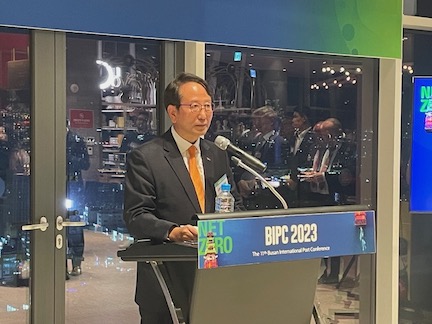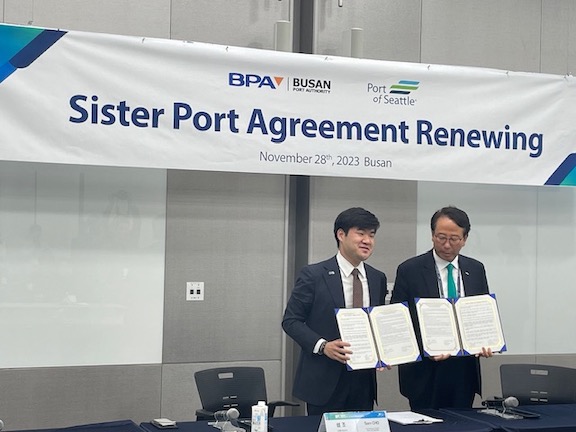Joon Suk Kang, President of the Busan Port Authority (BPA), hailed the progress made by South Korea’s largest port and said he welcomed collaboration with other ports in pursuit of decarbonization and digitization.
On November 28th, Kang welcomed attendees to the Busan International Port Conference (BIPC) at Busan, South Korea where he called for “sustainable growth strategies” and “collective insights “ with Busan Port partners.

The BIPC is the eleventh conference produced by BPA and was attended by over 600 people.
Kang cited green shipping agreements that the BPA is entering in with U.S. ports as one sign of international collaboration.
Stefan Ernst, President of the European Chamber of Commerce in Korea, praised the Busan port success story. He called it a tribute to the heroic efforts of the Korean people who in the aftermath of World War II and the Korean War transformed their predominantly agricultural country into a global economic powerhouse.
Kang announced that BPA was renewing a Sister Port agreement with the Port of Seattle, another collaboration.
At the Sister Port signing ceremony Kang explained a little of the history of the relationship between the two ports: “The Busan Port Authority is renewing the previous agreement with the Port of Seattle which was signed in 1981, long before the Busan Port Authority was established. This agreement is to strengthen mutual friendship and the collaboration between two ports in decarbonization and digitalization.”
Kang said the two ports face many challenges including decarbonization, digitization and port safety: “I am confident that if our two ports collaborate through information and knowledge sharing and human exchange on these common challenges, we can create tremendous synergy.”
In response, Sam Cho, President, Port Commission for the Port of Seattle welcomed the collaboration between the U.S. and Korean ports: “In 1981, South Korea was still a developing nation on the rise. And for many years, Busan and Korea were learning from western countries on how to become a modern nation. … I know this because as I was talking to my staff about the Sister Port relationship between Busan and Seattle, we were told that many of our team members from Seattle went to Busan to consult. in 2003 when Busan was considering a cruise terminal, we sent members of our cruise team to consult with their Korean counterparts.

Today the Busan port has become a world class port, a global hub, and the pride of Korea and one that stacks up against any world-class ports in the world … This is now my second time here in Busan and I must say that sometimes I think perhaps the roles have changed. The student may now be the teacher…. Today the Port of Seattle can learn a lot from the Port of Busan.
What is more important, is that as we move forward with the Sister Port agreement, that we work together and that we learn from each other and that we build together, which is why I think the renewal of the Sister Port agreement is so incredibly important and so opportune given that it is the 20th anniversary of the founding of the Busan Port Authority.”
Cho concluded by stating: “I am a second generation Korean American, and so for me to be serving as the President of the Port of Seattle Commission on the 20th anniversary of the founding of the Busan Port Authority and the 42nd anniversary of our initial Sister Port program is a tremendous honor.”


